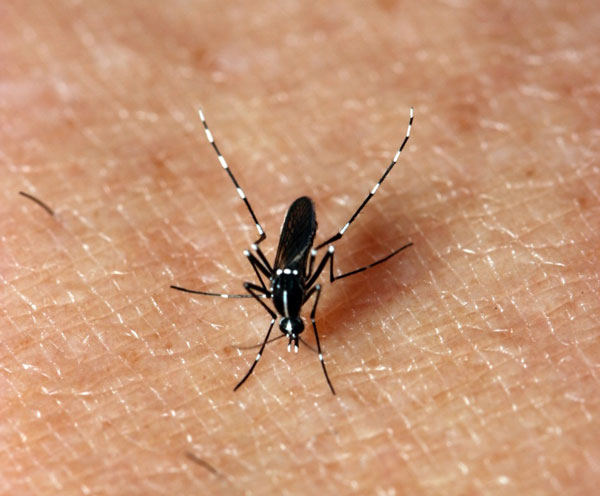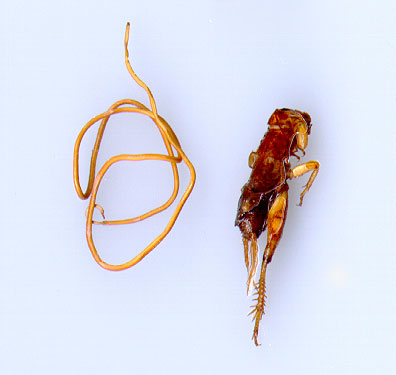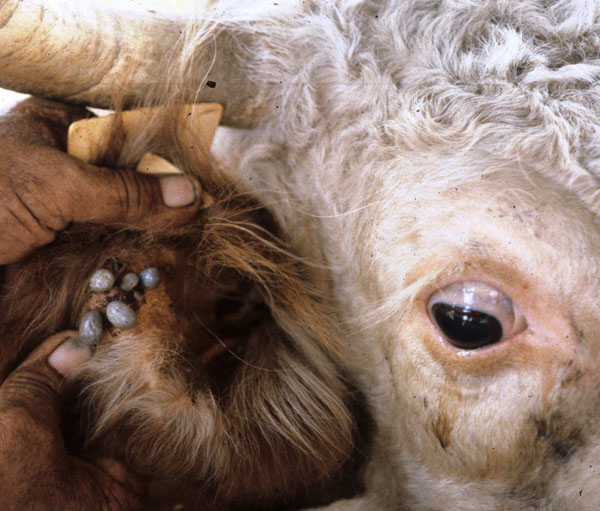- South Texas Students Meet Accordion Music Icons Los Tigres Del Norte In Edinburg Thanks To Khs America/Hohner Alianza Académica Initiative
- Fragile Planet Offers a Nighttime Wildlife Experience
- Falcons Soccer Off & Running
- Cameron County Receives Funds to Improve Two Parks
- Falcons Complete First Half of 32-6A
- School District to Help out Victims of California Wildfires
- Sand Castle Days Continued Despite Unexpected Weather
- Ready for District
- Discussion of Garbage Dumpster Rates, Agreements Between State & City on Highway Regulations, and More
- 31st Annual Shrimp Cook-Off is Right Around the Corner
AgriLife Extension Experts: Livestock Parasites, Pests Likely to Proliferate Due to Wet Weather
- Updated: June 24, 2016

Mosquitoes, including those that can carry West Nile virus, will also be on the increase after the recent rains and subsequent dry-out. Photo: Texas A&M AgriLife Extension Service/Dr. Mike Merchant
UVALDE — Excessive rains in many parts of the state have Texas A&M AgriLife Extension Service experts concerned about the possibility of increased parasite and pest activity with livestock.
“Wet weather creates conditions favorable for parasites to infect animals on pasture,” said Dr. Rick Machen, AgriLife Extension livestock specialist based in Uvalde.
Machen said with the recent wet weather the biggest challenge for cattle is the brown stomach worm. Affected animals lose weight and in severe cases may die of overwhelming clinical ostertagiasis, a disease characterized by severe diarrhea, edema and serious weight loss.
“The anthelmintic, or treatment, for this parasite can be used orally, topically or through injection,” Machen said. “Generally, I’ve found that for ease of application most producers prefer the topical or pour-on application.”
The pour-on application has the further advantage of providing some external control of horn flies and face flies as well as ticks, he said.
A side-by-side view of a horsehair worm and the cricket it infested. Photo: Texas A&M AgriLife Extension Service/Dr. Mike Merchant
“Wet weather also creates prime conditions for tick infestations and ticks are the primary vector for anaplasmosis, which causes severe anemia and can kill livestock,” Machen said. “And tick bites can cause swelling, redness and localized infections.”
He said spring-born nursing calves are the biggest benefactors of anthelmintic treatment this time of year.
The recent rains are also likely to create some parasite problems for sheep flocks, said Dr. Reid Redden, AgriLife Extension state sheep and goat specialist at San Angelo.
Redden said internal parasites such as roundworms and coccidia can occur in sheep during wet periods.
“Most flocks have some level of parasitic infection but symptoms from these infections really tend to show up during high rainfall as the amount of parasites build up and cause health issues,” he said.
Redden said the best control is preventive, but dewormers or anthelmintics can enhance control measures, especially when administered before the parasite’s eggs contaminate the pasture.

A side-by-side view of a horsehair worm and the cricket it infested. Photo: Texas A&M AgriLife Extension Service/Dr. Mike Merchant
“These drugs can be a powerful tool, but for long term-parasite management, dewormers cannot be the only preventative treatment,” he said. “If using anthelmintics, treat only the animals that need treatment in order to reduce the chance of the parasites building up a resistance to the dewormer.”
He said producers can also conduct a fecal egg count reduction test to determine if the dewormer is working.
“This will alert the producer that it’s time to switch classes of dewormers in the event the current dewormer is losing its effectiveness,” he said. “And using multiple classes of dewormers at the same time should be avoided unless advised by a veterinarian.”
Machen and Redden emphasized grazing management is a huge part of parasite management, noting stocking rate, forage availability and other aspects of grazing management play heavily into avoiding or minimizing internal parasites.
“There is also the aspect of genetic selection and looking for animals that are more resistant to these parasites,” Redden said. “It’s also good management to pay the most attention to those animals that are the most susceptible.”
They said each property must develop its own parasite management plan and no single program is appropriate for all operations, but plans should include good rotational grazing management, smart drenching and attention to genetic selection.
Mike Merchant, AgriLife Extension urban entomologist in Dallas, said he has been receiving inquiries from some county agents about worms appearing in puddles near horses. These may or may not be feeding worms or parasites, he said.
“Horsehair worms are among the parasites that tend to be around horses and are more prevalent when there’s a lot of rain,” Merchant said. “These parasites actually infest insects like crickets and grasshoppers. Parasite eggs ingested by the insect develop inside, becoming a thin, long worm several inches long.”
He said horsehair worms frequently drop into watering troughs where they can accumulate.
Mosquitoes, including those that can carry West Nile virus, will also be on the increase after the recent rains and subsequent dry-out. Photo: Texas A&M AgriLife Extension Service/Dr. Mike Merchant
“Coincidentally, insects, including those parasitized by horsehair worms, also frequently fall into the water of horse troughs and die,” Merchant said. “Horsehair worms, which emerge from parasitized insects, are often seen swimming in water troughs and are long and thin, and that’s how they got their name.”

Ticks are among the external parasites that may be found in greater number on cattle and other livestock as a result of recent rains. Photo: Texas A&M AgriLife Extension Service
Mary Wicksten, an invertebrate biologist with AgriLife Extension in the department of wildlife and fisheries, College Station, noted adult horsehair worms are non-feeding.
“However, the larvae infest insects and horses can pick up encysted eggs that could be washed into pastures from manure elsewhere or from mosquito bites from the millions of mosquitos that will thrive in puddles,” she said.
Merchant said mosquitoes will soon be proliferating due to the recent wet weather and subsequent dry-out.
“As we dry out, breeding sites are getting full, plus this time of year typically is the real beginning of mosquito season,” he said. “Mosquitoes can transmit a number of diseases, including West Nile, which is disease of horses as well as humans. This would be a good time for horse owners to make sure their animals are vaccinated.”
He also noted some types of floodwater mosquitoes are vectors for heartworm, so ranchers may want to take additional precautions with their working dogs and pets.
Several publications related to livestock parasites — internal and external – can be found at the Texas A&M AgriLife Extension Bookstore at http://www.agrilifebookstore.org/. Go to the site and enter the word “parasites” in the search field.
